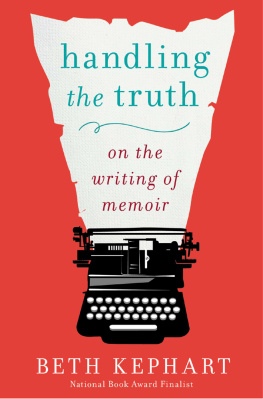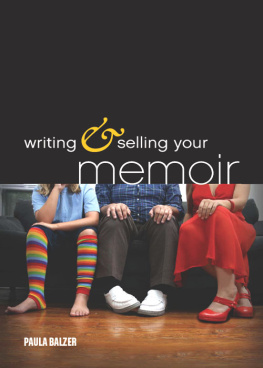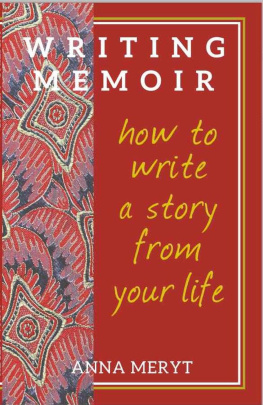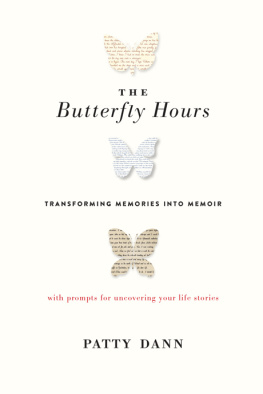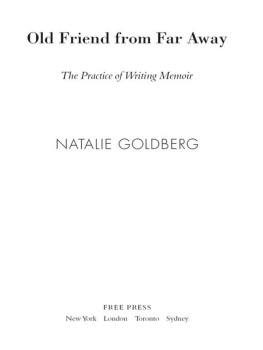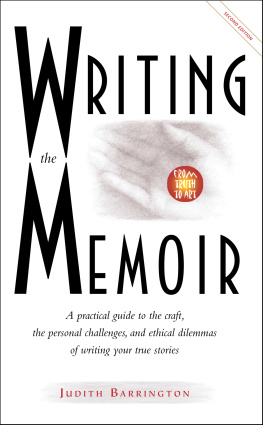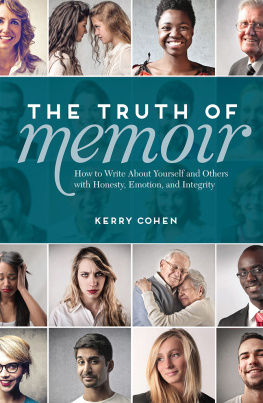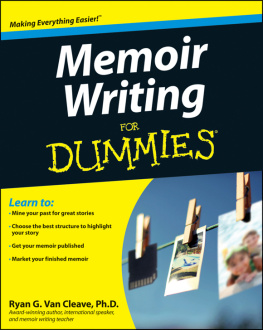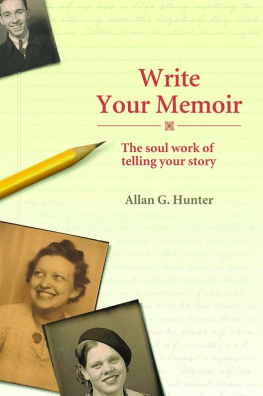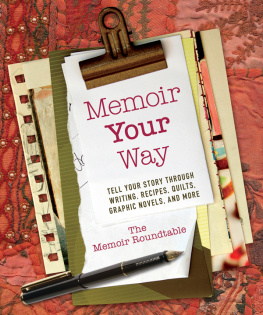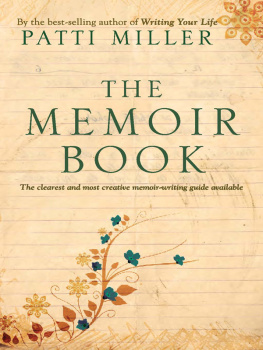HANDLING the TRUTH
HANDLING
the
TRUTH
On the Writing of Memoir
B ETH K EPHART
G OTHAM B OOKS
Published by the Penguin Group
Penguin Group (USA) Inc., 375 Hudson Street,
New York, New York 10014, USA
USA | Canada | UK | Ireland | Australia New Zealand | India | South Africa | China
Penguin Books Ltd, Registered Offices: 80 Strand, London WC2R 0RL, England
For more information about the Penguin Group visit penguin.com.
Copyright 2013 by Beth Kephart
All rights reserved. No part of this book may be reproduced, scanned, or distributed in any printed or electronic form without permission. Please do not participate in or encourage piracy of copyrighted materials in violation of the authors rights. Purchase only authorized editions.
Gotham Books and the skyscraper logo are trademarks of Penguin Group (USA) Inc.
Eggshell on page 80 copyright 1998 by Gerald Stern, from This Time: New and Selected Poems by Gerald Stern. Used by permission of W. W. Norton & Company, Inc.
LIBRARY OF CONGRESS CATALOGING-IN-PUBLICATION DATA
Kephart, Beth.
Handling the truth : on the writing of memoir / Beth Kephart.
pages cm
ISBN: 978-1-101-62018-2
1. AutobiographyAuthorship. 2. Biography as a literary form. I. Title.
CT25.K37 2013
808.06692dc23 2012043517
Designed by Spring Hoteling
While the author has made every effort to provide accurate telephone numbers, Internet addresses, and other contact information at the time of publication, neither the publisher nor the author assumes any responsibility for errors or for changes that occur after publication. Further, the publisher does not have any control over and does not assume any responsibility for author or third-party websites or their content.
for my studentsessential, inspiriting, whole-making
for Amy Rennert, who was sure
INTRODUCTION
Throughout the 1990s, I was an unknown and in many ways unschooled writer who was deeply in love with her son. Love, for me, was the time I sat with this boy reading stories. It was the songs I sang to him at night. It was the walks we took and the hats we bought and the important things he taught me about language both received and given, and courage made essential. I wrote love one fragment at a time. I webbed it together until discrete essays became a binding narrative. I sent the manuscript out, a slush-pile writer. When this small book of minea family book, an intimate bookfound readers beyond people I personally knew, I was utterly unprepared. I had been an outsider. I had written from the margins. I still had much to learn.
I would go on to write four more memoirs and a river book that I called Flow that assumed the memoirs form. I would be asked to conduct workshops and give talksin elementary schools, in middle schools, in high schools, at universities, in libraries and community centers. I would write about the writing life for publications great and small. I would chair juries for the National Book Awards and the PEN First Nonfiction Awards and serve on a jury panel for the National Endowment for the Arts. I would explore new genrespoetry, fable, young adult literature. I woulda brave experimentbegin to blog daily in memoiristic fashion. The important thing to me was this: I was still writing. I was still reading. I was still learning.
When the University of Pennsylvania asked me to teach creative nonfiction, I was not inclined to say yes. Raised up in memoir on my own, surrounded by my own huge but idiosyncratic memoir library, still in many ways making my outsider way into the book world, it wasnt at all clear to me that I would succeed within an Ivy League environment among faculty members who knew what teaching was. I hadnt grown up in the workshop system; how could I teach it? With the exception of three ten-day summer programs I enrolled in when I was already a mother, I had never taken a formal writing class. I was the true memoir autodidact, and this was Penn, where, as a student years before, I had studied the history and sociology of science, swerving clear of English.
As it turns out, teaching at Penn had been my calling all along. I eased into the responsibilityfirst mentoring a single student, then teaching a select advanced class, then taking on the teaching of Creative Nonfiction 135.302, which has become my favorite job of all. In teaching others memoir, I have taught it to myselfthe language of expectations and critique, the exemplary work of others, the exercises that yield well-considered work, the morality of the business, the psychic cautions. Teaching memoir is teaching vulnerability is teaching voice is teaching self. Next to motherhood, it has been, for me, the greatest privilege.
It has alsoperhaps inevitablyled to the writing of this book. Handling the Truth is about the making of memoir, and the consequences. Its about why so many get it wrong, and about how to get it right. Its about the big questions: Is compassion teachable? Do half memories count? Are landscape, weather, color, taste, and music background or foreground? To whom does then belong? And what rights do memoirists have, and how does one transcend particulars to achieve a universal tale, and how does a memoirist feel, once the label is attached, and what is the language of truth? Handling the Truth is about knowing ourselves. Its about writing, word after word, and if it swaggers a little, I hope it teaches a lot, providing a proven framework for teachers, students, and readers.
ONE
DEFINITIONS, PRELIMINARIES, CAUTIONS
PREFATORY
MAYBE the audacity of it thrills you. Maybe its always been like this: You out on the edge with your verity serums, your odd-sized heart, your wet eyes, urging. Maybe this is what you are good for, after all, or good at, though there, youve done it again: wanted proof, suggested the possibility. You teach memoir. You negotiate truth. Goodness doesnt matter here. Bearing witness does.
Memoir is a strut and a confession, a whisper in the ear, a scream. Memoir performs, then cedes. It is the work of thieves. It is a seduction and a sleight of hand, and the world wont rise above it.
Or you wont. You in the Victorian manse at the edge of the Ivy League campus, where you arrive early and sit in the attitude of prayer. You who know something not just of the toil but also of the psychic cost, the pummeling doubt, the lacerating regrets that live in the aftermath of public confession. You have written memoir in search of the lessons children teach and in confusion over the entanglements of friendships. You have written in despair regarding the sensational impossibility of knowing another, in defense of the imperiled imagination, and in the throes of the lonesome sink toward middle age. You have written quiet and expected quiet, and yet a terrible noise has hurried ina churlish self-recrimination that cluttered the early hours when clear-minded nonmemoirists slept. You have learned from all that. You have decided. Memoir is, and will still be, but cautions must be taken.

